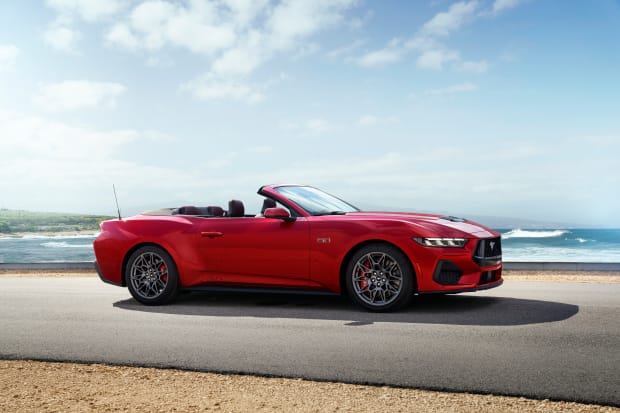The oldest mass-car maker in the world isn’t giving up on the gasoline-powered internal combustion engine just yet.
Ford (F) on Wednesday revealed its seventh-generation Mustang sports car that will very much contain lots of pistons and other moving parts that require oil, gasoline and sparks to make the wheels spin -- and make lots of noise and emit carbon emissions doing so.
The unusual move comes as Ford rival General Motors (GM) revealed its own plan to beat Tesla (TSLA) at its own game with a $30,000 electric vehicle for all. It also came on the very same day President Joe Biden announced the first round of funding for an EV charging network across 35 states.

Both announcements were made at the 2022 Detroit Auto Show.
The contrarian decision also stands out for Ford, which despite mass-selling gasoline-powered cars for more than 119 years has been aggressive in adding more EVs to its lineup. Ford executives have said they expect 40% of the company’s global sales to be fully electric by 2030.
You Just Can't Rev an EV
The Mustang has a long history of attracting drivers who still pine for the loud rumble of a V-8 engine and the thrill of the sounds and smells of revving it -- something that is physically impossible to do with an electric vehicle -- is something Ford still sees a market for.
At the same time, it flies in the face of the broader consensus that battery powered vehicles are set to replace the 100-plus-year-old internal combustion engine in the near future. California just last month announced a controversial decision to get gas-powered vehicles off the road in 13 years, and Ford itself is pushing its own dealers to become “EV Certified” by Oct. 31.
The redesigned Mustang will go on sale as a 2024 model year vehicle and offer new engine options, along with an overhauled interior with two, curved displays that owners can customize. Pricing is expected to be disclosed closer to the release date.
Ford already has an electric SUV that wears the Mustang logo -- the Mustang Mach-E. The company took a gamble in affixing the pony-car name to the fully electric model when it went on sale in late 2020, but so far, the Mach-E has done well with consumers.
Still a Market for Muscle Cars
Ford last year sold 52,400 Mustang sports cars in the U.S., about a 57% drop from 2015, when sales for this model last peaked, according to the company’s sales reports.
To be sure, it’s not just Ford that still sees demand and a market for muscle cars. This summer, Dodge showed off a new concept for a muscle car that is expected to replace the Challenger and Charger, which will be discontinued after the end of next year.
It too makes loud growling noises that sound just like a muscle car, but without a gasoline-powered engine under its hood: the car is also an EV, and the exhaust tone is entirely simulated.
The Dodge Charger Daytona SRT Concept "offers a glimpse at the brand’s electric future through a vehicle that drives like a Dodge, looks like a Dodge and sounds like Dodge," the automaker said.







